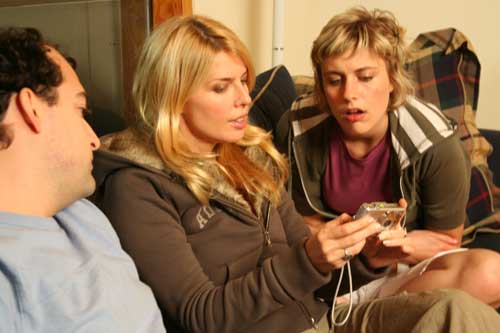
The mumblecore movement, marked as it is by a general lack of movement, has been ripe for parody ever since a sloppy, white, twenty-something first pointed his camera at slackers talking about their relationships. It's a loosely defined aesthetic of low-budget filmmaking among friends, and while its best movies -- like those by Andrew Bujalski and Joe Swanberg -- are intimate and funny, they're always a millimeter away from solipsism.
In 2005 Mark and Jay Duplass made The Puffy Chair about a downbeat road trip and a romance on the rocks. It was an early, unremarkable entry in the catalog, but their second film, Baghead, sinks a stake more firmly in the ground. The story involves four out-of-work actors who see a micro-budget indie flick at a film festival and decide, hey, we could do that. So they head to a cabin in the woods to write a screenplay for themselves.
The jokes practically write themselves, but the Duplass brothers demonstrate that the filmmakers who are best prepared to poke fun at mumblecore are probably the mumblers themselves. Once they've isolated their four characters from the world, a dozen friendly and romantic possibilities arise, many of them drawing from a setting the Duplasses are likely familiar with: the script brainstorm. But like the best films of their peers, what could have been a pointlessly self-referential exercise, where every bit of dialogue seems lifted from the filmmakers' lives, Baghead shows a nimble and discriminating editorial sense. All of the dialogue is banal by design, so the trick is to navigate a mundane conversation and cull the important bits that are as normal on the surface as everything else. "I think you're so amazing," says one of the girls to one of the guys in a quiet moment, sounding vaguely hesitant, as if she's lingering on "so" because she needs to think of a convincing adjective. Then she adds, "You're like my friend and my brother," which isn't quite what her pal wants to hear.
But more impressive than the understated humor of the dialogue is the brothers' tremendous facility with genre conventions. What looks casual isn't, and when the film begins to shift its tone away from simple parody into something a little creepy -- after all, our heroes are alone in a remote cabin -- the Duplasses blow their cover. Despite the cheap, herky-jerky camera, they're more precise filmmakers than I'd imagined. And as the suspense takes hold, they provoke the question, "What kind of movie is this?"
Part of the reason this strategy works is that it springs from the humble seeds of mumblecore. The Blair Witch Project, shot with similar technical constraints, attracted audiences who'd been told they were in for the scare of their lives, but Baghead comes from a tradition of friends talking to friends about friends and friends-of-friends. On camera. So the unexpected creepiness is unsettling because, when it arrives, the film has left the comfy couch with no indication of how far it intends to stray or even if it meant to go this far. Am I supposed to have these goosebumps? Is the call sorta coming from, you know, inside the, like, house?
Like Bujalski's Mutual Appreciation and Swanberg's LOL, Baghead seems incapable of supporting too-lofty expectations. It's a wonderfully entertaining film carefully engineered from toothpicks. Don't sit on it. Don't stack your back issues of Film Comment on it. But marvel nonetheless at its casual ingenuity.



